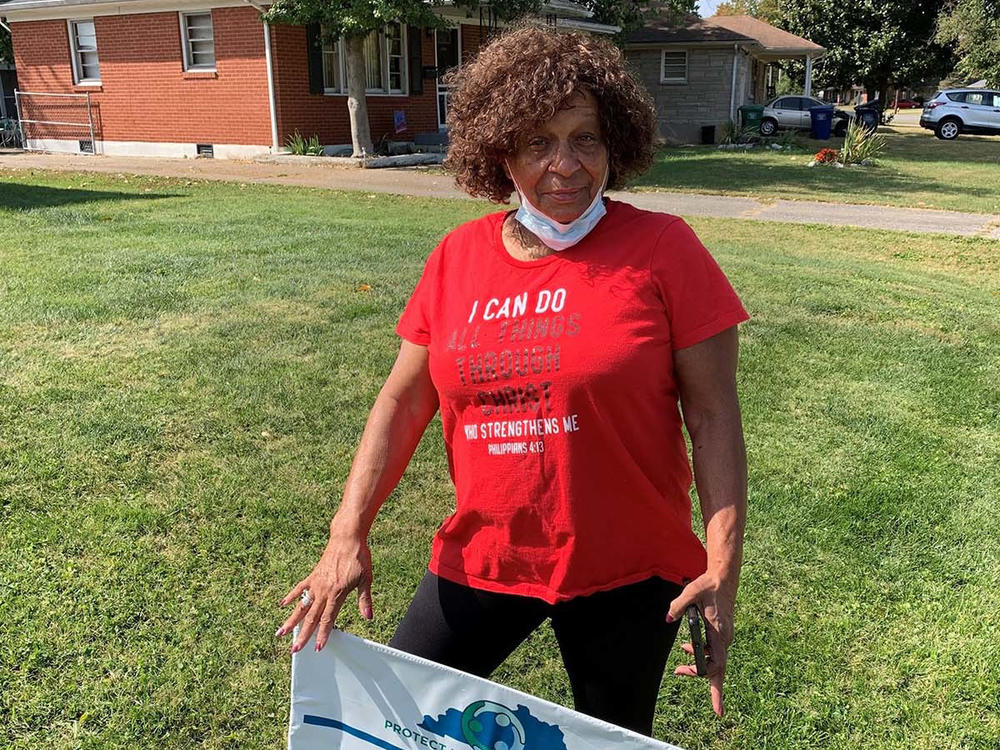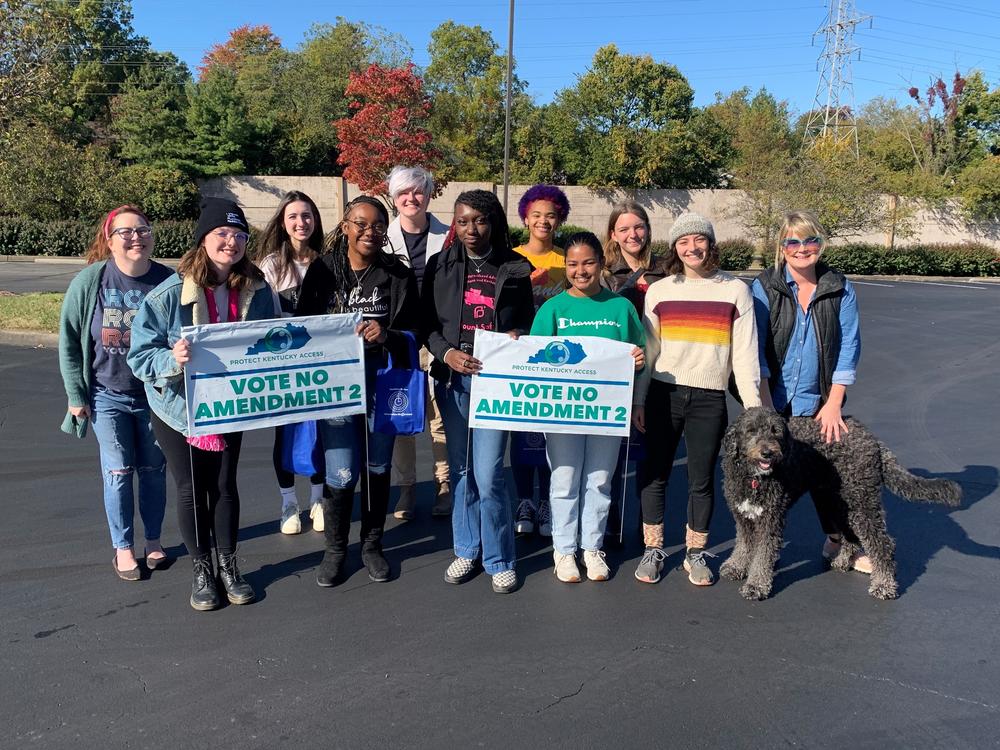Section Branding
Header Content
In Kentucky, abortion rights activists hope for a repeat of Kansas win
Primary Content
LOUISVILLE, Ky. — Abortion has been unavailable for months in Kentucky, and will likely remain so – unless activists can defeat an anti-abortion measure on the Nov. 8 ballot.
"It's very rigid and unforgiving as a constitutional amendment," Beth Kuhn, a volunteer for the Protect Kentucky Access campaign, told a voter who answered her knock on his front door on a recent sunny afternoon in Louisville.
Kuhn explained that Amendment 2 would add explicit language to Kentucky's constitution, stating that it offers no protections for abortion rights.
Activists appeal to state courts
If approved, Amendment 2 would complicate — if not entirely thwart – ongoing efforts to overturn two state abortion bans that are currently in effect. Those laws offer no exceptions for rape or incest and only narrow exceptions for medical emergencies. They took effect this summer, after the U.S. Supreme Court overturned decades of abortion-rights precedent, including Roe v. Wade.
That left reproductive rights advocates with little recourse beyond Kentucky's state constitution, which they argue contains privacy protections that should safeguard at least some abortion access.
Looking to Kansas
Now, voters are being asked to weigh in on a measure that would amend the Kentucky constitution to explicitly state that it contains no protections for abortion rights. And reproductive rights activists are drawing inspiration from Kansas, another red state where voters rejected a similar effort in August.
"In order to restore access to legal abortion in Kentucky, we have to defeat Amendment 2," says, Rachel Sweet, campaign manager for Protect Kentucky Access, the effort to scuttle the amendment. "And then the plaintiffs in those case cases need to win."
In August, Sweet led the successful effort to defeat the anti-abortion amendment in Kansas, where abortion remains legal up to 20 weeks. That vote — in another conservative-leaning state — surprised many observers.
Sweet says here in Kentucky, the stakes are even higher.
"In Kansas, we were trying to really make an argument about protecting the status quo and protecting the rights that we had in the Kansas Constitution," Sweet says. "This is really about how do we start reversing the tide of these really extreme abortion restrictions that we've seen?'
A chance to make abortion bans permanent
For Kentuckians who oppose abortion, Amendment 2 offers an opportunity to shore up state restrictions for the long term.
Addia Wuchner, executive director of Kentucky Right to Life, is a leader of the "Vote Yes" campaign. She points to decades of federal litigation around abortion under the Roe v. Wade precedent that legalized abortion nationwide from 1973 until this year, saying she wants to make sure that Kentucky doesn't see drawn out battles over abortion bans in its state court now.
"We've been in 49 years of Roe," Wuchner says. "No one wants 49 years of the Kentucky Constitution drug out into this battle."
Public polling on the ballot initiative is hard to come by. But a 2019 survey from the firm Public Policy Polling found that a majority Kentuckians support abortion rights and oppose criminalizing the procedure.
Wuchner argues the amendment before voters would keep the state constitution neutral on abortion — which her organization opposes in virtually all circumstances.
"Let's talk about what [opponents of the amendment] are afraid of," Wuchner says. "Afraid that they won't have the right for women to take the lives of their children. Do you think that's a right?"
Wuchner notes that here in Kentucky — as in Kansas — abortion rights supporters have significantly out-fundraised groups who oppose abortion.
But the amendment also has strong support from powerful conservative religious groups, including the Catholic Conference of Kentucky and the Kentucky Baptist Convention.
Echoes of an earlier time
Standing on her front lawn across town, Altia Connor says her faith points her to a different conclusion when it comes to abortion.
"[People] have to answer to God for themselves. But it's still their right ... to their body," she says.
Connor is standing in the sunshine as a local activist delivers a yard sign that says, "VOTE NO — Amendment 2."
Now 71, Connor was a teenager in the 1960s — before Roe v. Wade. She remembers girls sometimes taking desperate measures when they got pregnant — particularly one girl from her church, who died after a botched abortion.
"I'm thinking now, as a grownup, that young girl didn't have to die," she says. "She didn't have to try these homemade remedies ... if she'd had another choice."
A message to state leaders
Once again, Kentuckians do not have that choice.
Saundra Curry Ardrey, a political scientist at Western Kentucky University, said voters have an opportunity to send a message to state leaders – especially Supreme Court justices – about where they stand on the issue. She notes that Kentucky's Supreme Court is waiting to rule on the future of the state's abortion bans until after the election.
"I think they are waiting to see what the will of the people will be," Ardrey said. "And I would suspect, too, that a lot of the candidates, and a lot of the legislators in the state, are also looking to see how pro-choice Kentucky has become, or what the will of the people will be."
Copyright 2022 NPR. To see more, visit https://www.npr.org.



